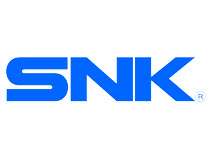Shin Nihon Kikaku

The Future Is Now—Company Motto, 1986-2001
SNK, an acronym for Shin Nihon Kikaku (新日本企画, Japanese for "New Japan Project"), is one of the better known video game companies. Besides developing arcade games dating back to 1978, SNK is also responsible for the Neo Geo home console, as well as the short-lived Hyper Neo Geo 64 and portable Neo Geo Pocket. The company's legal and trading name became SNK in 1986. It also possesses a unique story of collapse and rebirth: After things started to look bad in the beginning of 2000, SNK was forced to declare bankruptcy and sold many of its rights to various companies... but eventually, with hard work and effort, its CEO, Eikichi Kawasaki, eventually gathered up many of its former rights and rebuilt SNK, now named SNK Playmore.
SNK is mostly known for its fighting games and was once the biggest rival of Capcom in that field; this rivalry was embodied in the SNK vs. Capcom crossover series. Their fighting game bosses have a reputation for being extremely harder than their rival companies' counterparts, thus making them the Trope Namers for SNK Boss. To casual observers, SNK's 2D fighters were mere imitators of the Street Fighter series, but this is not the case. The combat systems are totally different, with SNK's Art of Fighting series introducing the whole concept of the super special move that would go onto to become a fighting game staple. Also, although both employed luxuriously rich, detailed 2D visuals, SNK's backgrounds were more expressive, and often filled with comic touches. It's also worth pointing out that staff have switched between the Capcom and SNK camps over the years, with original Street Fighter creators Takashi Nishiyama and Hiroshi Matsumoto going onto to work at SNK, notably creating the KOF and Fatal Fury series, while famed illustrator Shinkiro as well as lesser known Senri Kita started at SNK but now work for Capcom. Daisuke Ishiwatari, known best for his work on Guilty Gear and BlazBlue, was also employed under SNK as part of the team developing The Last Blade. If you look at his work (and sometimes squint), you can see more than a few Shout Outs to SNK's properties.
Not to be confused with SnK, the manga and anime translated as Attack on Titan.
Games developed:
Fighting games
- Street Smart (1989)
- Fatal Fury series (1991–1999)
- Art of Fighting series (1992–1996)
- Samurai Shodown series (1993–1998, 2003-present)
- The King of Fighters series (1994–present)
- Fuun Series (1995–1996)
- The Last Blade series (1997–1998)
- Buriki One (1999)
- SNK Gals Fighters (2000)
- SNK vs. Capcom: SVC Chaos (2003)
- Neo Geo Battle Coliseum (2005)
Others
- Athena
- Baseball Stars
- Crystalis
- Guerrilla War
- Ikari Warriors
- The King of Fighters: Sky Stage
- King of the Monsters series
- Metal Slug series
- NAM-1975
- Prehistoric Isle series
- Psycho Soldier
- Sengoku series
- Super Sidekicks series
- Vanguard
- American Kirby Is Hardcore: Compare the American box art and flyers of some earlier releases to their Japanese counterparts. Check out the artwork for Athena and Psycho Soldier, for example.
- Author Appeal: SNK Bosses and Dream Match Games. This company seems to love making them, especially the former.
- Fan Service: From full to none and everything in between. Also a pioneer of fighting game manservice.
- They've got the non-sexual fanservice covered just as well, if not even better.
- Gratuitous English: Especially in the Samurai Shodown games.
- Terry Bogard. We cannot stress this enough.
- Blind Idiot Translation: Very frequently in earlier releases, which often had a tendency of ruining scenes.
- Magnum Opus: Garou: Mark of the Wolves is widely considered to be the last great SNK game. Even fans of the genre who otherwise loathe SNK love MotW for its polish and complexity.
- The Last Blade games also get this kind of aplomb. Not quite at Garou's level, but still considered to be the cream of the crop.
- Notable Original Music: Overlaps with Awesome Music to enough of an extent that it has its own page.
- Nintendo Hard: These guys are probably outdone only by Nintendo themselves and Atlus (and if you're willing to stretch the lines, maybe Capcom).
- Rouge Angles of Satin: The game Mutation Nation has the Big Bad saying "How dare you beat me! Hear is your graveyard."
- Rule of Symbolism: SNK's first notable fighting game, Fatal Fury, introduces the city of Southtown. The bulk of the Fatal Fury and Art of Fighting series take place in Southtown, detailing and developing it, pretty damn believably at that. The final game of the original SNK, The King of Fighters 2000, ends with Southtown being blown up.
- And in 2003, Southtown was shown to have recovered from the Zero Cannon's attack, symbolic of SNK's resurrection as SNK Playmore.
- With the exception of KOF '99, Kyo (with or without the rest of the Japan Team) always had a theme with the word "Esaka" in it during KOF's pre-bankruptcy run. Esaka was a train station in Osaka near the site of SNK headquarters resided, and when SNK went bankrupt, they moved out of the building. Thus, Esaka was interchangeable with SNK to their fans. In 2000, the swan song of the old SNK, Kyo receives a heartful, emotional ballad known as "Goodbye Esaka." They might as well just called it "Goodbye SNK" for all it's worth.
- And to twist the knife further, that theme had been preceded only three games earlier with "Esaka Forever." Looking back, it's tragically ironic.
- SNK Boss: Known amongst fighting games fans as "SNK Boss Syndrome". And for a good reason.